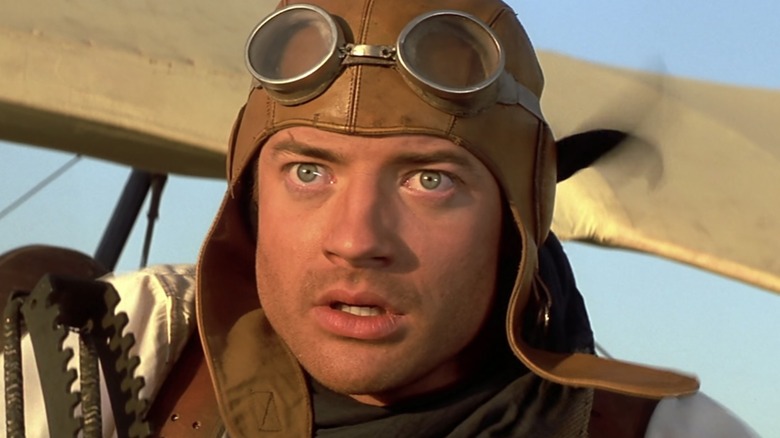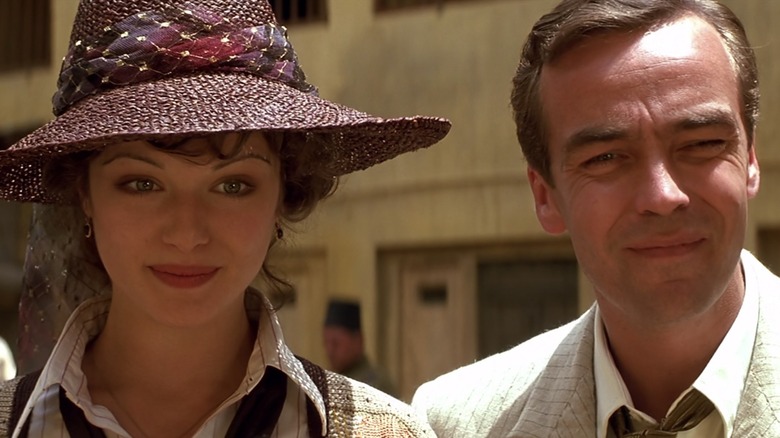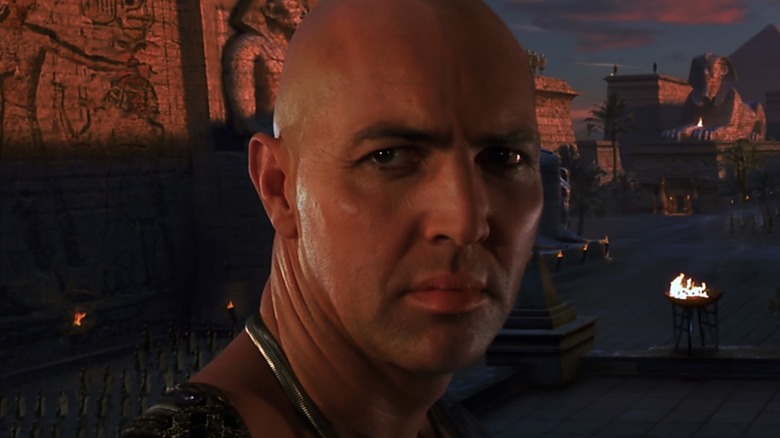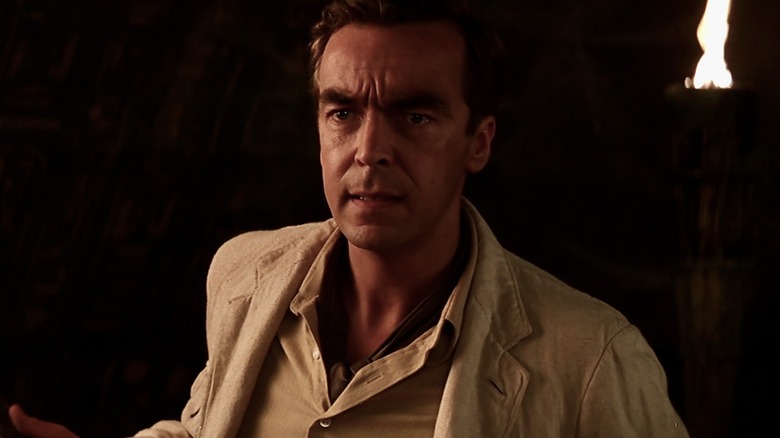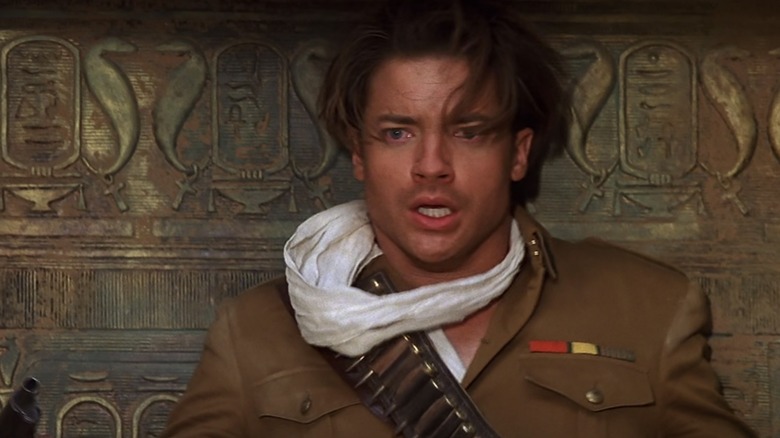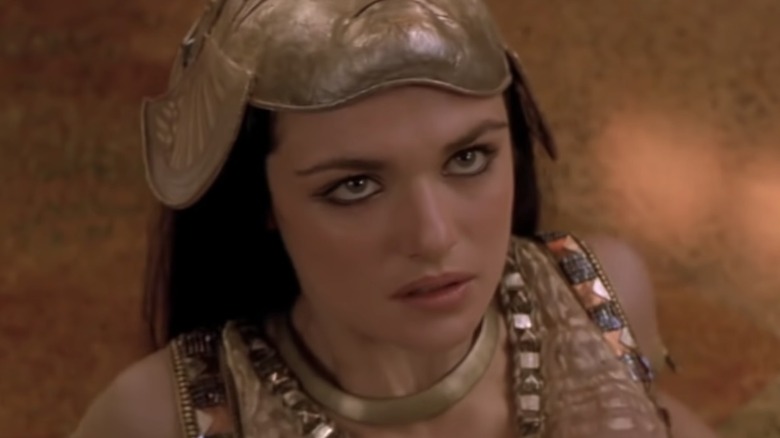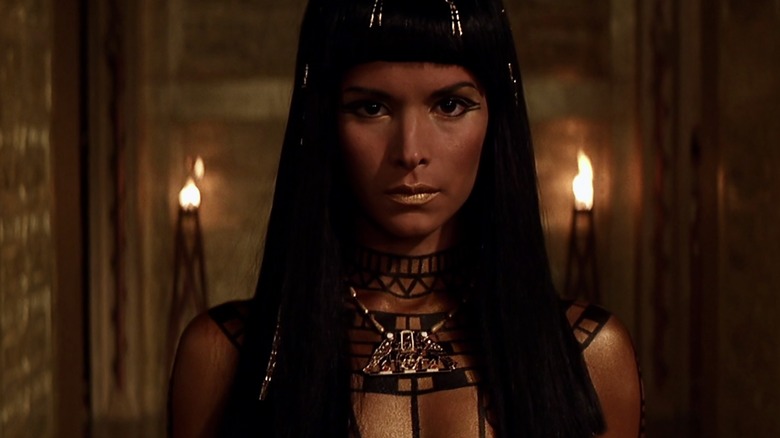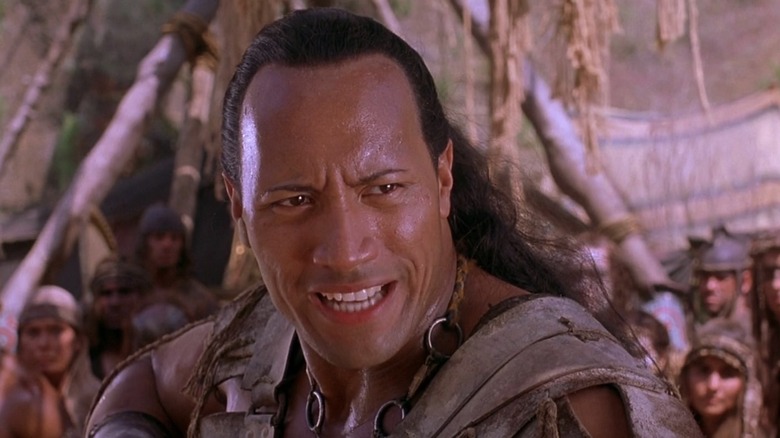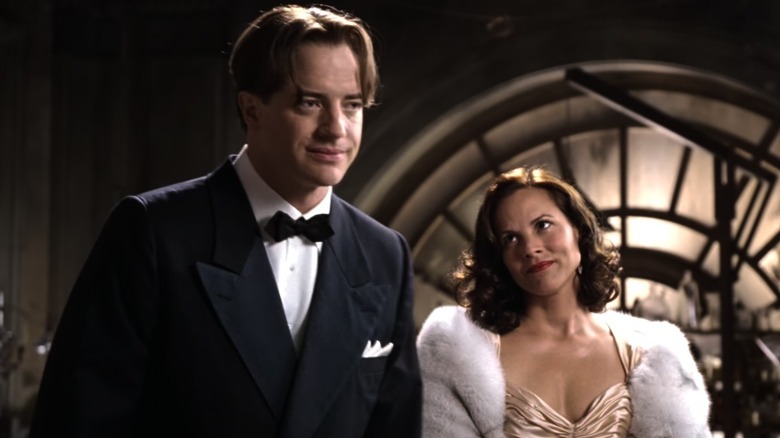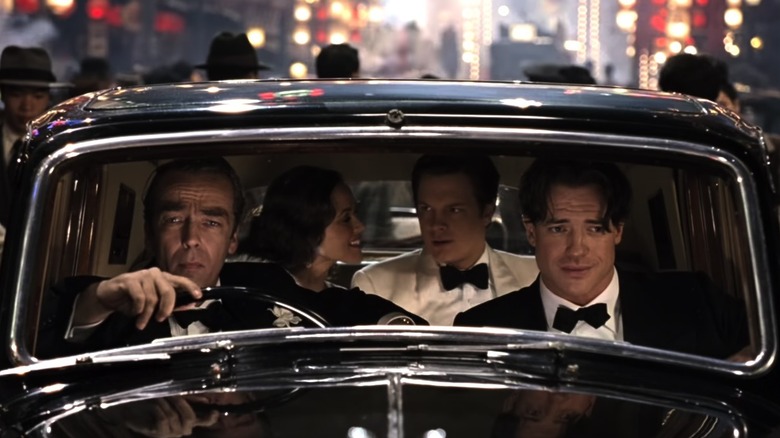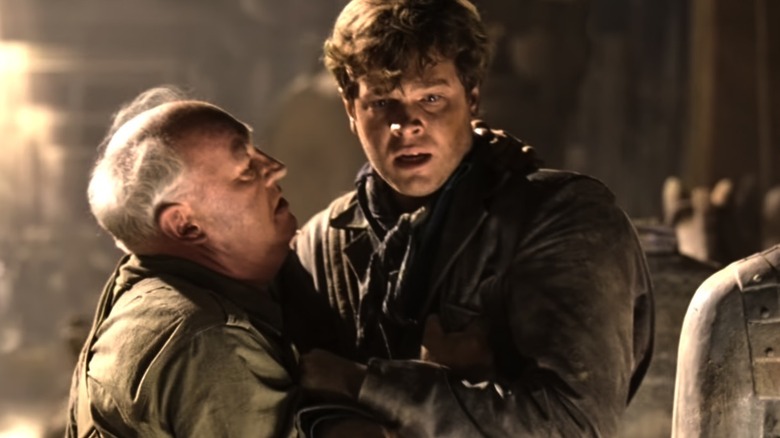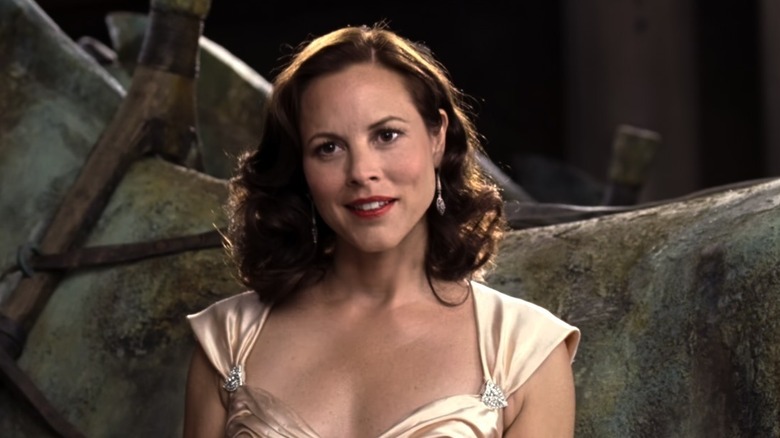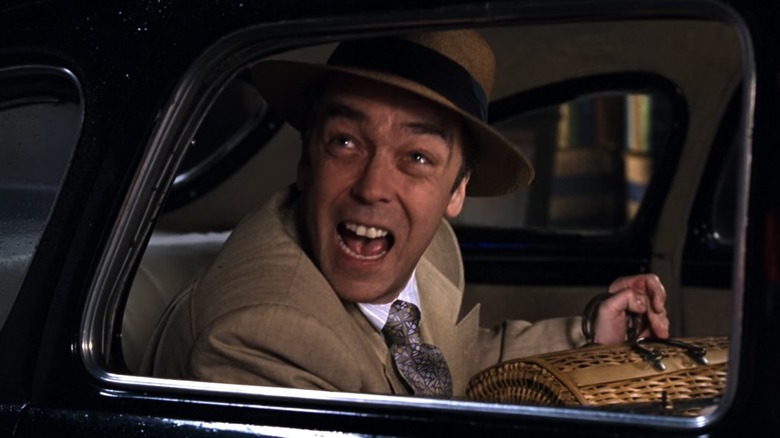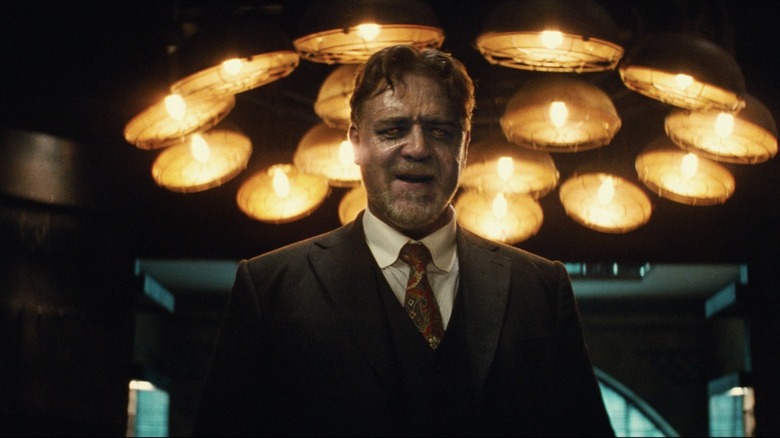Biggest Unanswered Questions From The Mummy Franchise
The modern "Mummy" franchise began when Universal Pictures launched the box office smash "The Mummy" in 1999, following it up with a high-earning sequel "The Mummy Returns" in 2001. These back-to-back blockbusters starring Brendan Fraser, Rachel Weisz, John Hannah, and Arnold Vosloo revitalized the action-adventure genre by embracing an Indiana Jones-inspired vibe, fusing humor with horror and action with romance. The franchise expanded with a spin-off starring Dwayne "The Rock" Johnson as "The Scorpion King," which spawned a straight-to-DVD film series of its own.
In 2008, a third film starring Brendan Fraser hit screens, unsuccessfully transplanting the action from Egypt to China in "The Mummy: Tomb of the Dragon Emperor." Despite adding martial artist icons like Jet Li and Michelle Yeoh to the cast, Weisz didn't reprise her role, and the film suffered. In 2017, Universal attempted a relaunch as part of its "Dark Universe" initiative, and Tom Cruise joined the franchise with a reboot of "The Mummy" set in contemporary times. The film failed to relaunch much of anything, was panned by critics, and didn't fare much better with audiences on Metacritic.
"The Mummy" franchise has admittedly gone downhill over the years, but it started out with a bang, creating a fascinating universe filled with grave robbers, archeologists, warriors, gods, monsters, and one gutsy librarian. Join us as we revisit the adventures of Rick, Evie, Jonathan, Alex, and the many monsters they battled, while we search for answers to the biggest unanswered questions of the franchise.
What happened to Evie and Jonathan's parents?
Early in "The Mummy," after Evie (Rachel Weisz) accidentally knocks over the bookcases at the museum where she works in Cairo as a librarian, her boss Dr. Terrence Bey (Erick Avari) tells her he puts up with her because of how much he cared for her parents, who were the library's most generous donors. Apparently, these mishaps are commonplace occurrences when Evie is around. In the film's action, we never learn what happened to Evie and Jonathan's parents, but from this conversation, it's safe to assume they are no longer living.
As Evie tells Rick O'Connell (Brendan Fraser) on their first night in Hamunaptra, her father was a renowned adventurer who met and fell in love with her mother in Egypt, where her mother was born. The couple raised their children in England at the sprawling English estate we see for the first time in "The Mummy Returns." But even in the sequel, we never learn from Evie or her brother Jonathan (John Hannah) what happened to their parents.
Did they die while on an adventure? Is this why Evie became a librarian instead of following her passion, becoming an Egyptologist? According to the Mummy Fandom wiki, Evie and Jonathan's parents died before the events of "The Mummy" in a plane crash related to a cursed mummy whose tomb their father disturbed. With no other sources to substantiate the theory, it's just conjecture, but it certainly suggests supernatural hijinks run in the family.
Why does Imhotep wield the power of the ten plagues of Egypt?
In "The Mummy," Evie explains how Imhotep (Arnold Vosloo) was cursed with the Hom-Dai for falling in love with the pharaoh's mistress, Anck-Su-Namun (Patricia Velasquez), and for killing Pharaoh Seti I (Aharon Ipalé) once their affair was discovered. Evie explains how the curse was feared in ancient Egypt because it would imbue him with the power of the ten plagues of Egypt if someone ever resurrected him.
As Brad Curran of Screen Rant points out, this is a "historical plot hole." In "The Mummy," Imhotep served Seti I as the High Priest of Osiris. After Evie accidentally resurrects Imhotep by reading from the Book of the Dead, Imhotep recognizes the language of the slaves when Beni (Kevin J. O'Connor) begs for his life in Hebrew in the tomb at Hamunaptra. Imhotep recognizing the language of the Hebrews makes sense, because they built tombs for Seti I.
According to National Geographic, Pharaoh Seti I ruled between 1290 and 1279 B.C.E., but it was Seti's successor, Ramses II who ruled between who is believed to be the Pharaoh who went toe to toe with Moses, bringing the ten plagues upon Egypt when he wouldn't let Moses' people go. This means Imhotep died and was cursed with the Hom-Dai, giving him power over the ten plagues before Moses unleashed the plagues upon ancient Egypt. Of course, who are we to ask for historical accuracy in a fantasy adventure?
Why didn't they suffer the last plague of Egypt in The Mummy?
We see many of the ten plagues of Egypt carried out during the action of "The Mummy," including water turning to blood, swarms of locusts, and an eclipse blotting out the sun. The plague of boils and sores on a group of Egyptians who are transformed into Imhotep's zombie-like minions is perhaps the most dramatically portrayed in the film. Still, the final plague — the death of firstborn sons, which would have threatened Jonathan's life and the lives of every other eldest son in Egypt — never materializes.
Do Rick, Evie, and Jonathan beat Imhotep before he gets around to unleashing the last plague, or does he simply stop throwing plagues at them once they've Cairo and headed back to Hamunaptra? Maybe the filmmakers didn't want to go quite that dark. This seems like a missed opportunity to up-the-ante of tension in the movie, having Jonathan threatened with death and giving them a countdown to sunrise to defeat Imhotep. Alas, we don't see the plague of livestock or lice either, so we can all thank the ancient gods for saving us from that.
How did Rick O'Connell wind up in an orphanage in Cairo?
In "The Mummy Returns" we learn that Rick O'Connell has a tattoo hidden under the leather armband he wore on his wrist throughout the first film. Evie and Rick's 8-year-old son Alex (Freddie Boath) finds an ancient Egyptian inscription that matches his father's tattoo at the excavation site where his parents unearth 'The Bracelet of Anubis' in the opening scenes of the film. This tattoo winds up being very important.
When Ardeth Bay (Oded Fehr), the Medjai warrior from the first film, follows a group of tomb raiders intent upon stealing The Bracelet of Anubis to the O'Connell estate, Ardeth tells Rick that marking means he is a Medjai, destined to protect the people of Egypt. Despite knowing the call and response Medjai use to recognize each other, Rick insists it's just a tattoo they put on him when he was in an orphanage in Cairo as a child.
Successful sequels find inventive ways to build upon the background of their main characters while delving deeper into the themes and mysteries of the franchise. "The Mummy Returns" does this by revealing Rick has a connection to Egypt. Although the film never explores Rick's childhood, the episode "Like Father, Like Son" of the animated series reveals that Rick's father, Jack, abandoned his family when Rick was ten years old. After Rick's mother died, he wound up in an orphanage, although the location of the orphanage changes from Cairo to Chicago.
Why didn't Imhotep recognize Evie as the reincarnation of Nefertiri in The Mummy?
In "The Mummy Returns" we learn that Evie is the reincarnation of the daughter of Pharaoh Seti I from the first film. During the action of the sequel, Evie uses memories of her past life (which have been manifesting as dreams) to find the Bracelet of Anubis by accessing a hidden room in the tomb they're excavating at the beginning of the film. Evie's connection to ancient Egypt, explored through the concept of reincarnation, is absolutely fascinating.
When Evie remembers more about her past life from a vision during their trip to Ahm Shere, she discovers that Nefertiri was the protector of the Bracelet of Anubis, explaining why she knew how to find it. Both Evie's connection to the bracelet and Rick's connection to the Medjai warrior, depicted as the one capable of killing the Scorpion King, certainly imply that Evie and Rick meeting and falling in love was fated by the ancient gods.
Unfortunately, this fascinating plot development in the sequel creates a little confusion about details in "The Mummy." Why didn't Imhotep recognize Evie as the reincarnation of Nefertiri when he met her in the first film? A fan on Reddit posits Imhotep initially mistook Evie for Anck-Su-Namun because his eyesight was blurry after stealing Burns' (Tuc Watkins) eyes. Meanwhile, TV Tropes suggests that Imhotep recognized her and said nothing because it was immaterial to his desire to use Evie's body to resurrect Anck-Su-Namun.
Why does Imhotep say Meela is Anck-Su-Namun reincarnated only in body?
In "The Mummy Returns" both Evie and Meela (Patricia Velasquez) have memories from their past lives in ancient Egypt, where they knew each other as Nefertiri, the daughter of Seti I, and his mistress Anck-Su-Namun. While spending the night in Karnak after having his body and powers restored, Imhotep takes Meela to a pool of water to perform a ritual with the Book of the Dead that will pull Anck-Su-Namun's soul from the underworld and into Meela's body with a sacrifice and resurrection spell.
But why does Imhotep say that Meela is only reincarnated in body, not spirit? This is where we get into the nitty-gritty of how the fictional universe of "The Mummy" franchise differs from ancient Egyptian philosophies about souls and the afterlife. According to the World History Encyclopedia, if the film followed ancient Egyptian customs, Anck-Su-Namun would no longer have a soul to resurrect. Murdering the Pharaoh would have condemned her to be eaten by Ammit/Ammut, the devourer of the dead.
In "The Mummy Returns" both Evie and Meela have been reincarnated in bodies resembling a past life, with vague memories to guide them to Egyptian relics that could help restore their souls and memories. Imhotep has the power to complete the reincarnation, bringing Anck-Su-Namun's soul back from the underworld with a ritual to possess Meela's body, reuniting the lovers who were separated by death for thousands of years.
How does Mathayus go from being a liberator to the evil Scorpion King?
In the prologue of "The Mummy Returns," we learn of the deal that the Scorpion King (Dwayne "The Rock" Johnson), an ancient warlord who predates the pyramids, made with the god Anubis. The spin-off prequel "The Scorpion King" introduces us to a very different Mathayus before he came to power and transformed into the power-hungry warlord we know.
As a hired mercenary, you could argue that Mathayus already had questionable morality, but he proves himself to have integrity despite his status as an Akkadian assassin. He doesn't kill the Sorceress (Kelly Hu) they hired him to kill, instead joining forces with the other free tribes to defeat the power-hungry warlord Memnon (Steven Brand). So, how did Mathayus go from being a liberator to an evil conqueror?
Although the films that followed take us back to when Mathayus (Michael Copon) was a young man in "The Scorpion King 2: Rise of a Warrior" and after Mathayus' (Victor Webster) kingdom has fallen and he's returned to being a hired assassin in "The Scorpion King 3: Battle for Redemption" and "The Scorpion King 4: Quest for Power," the series never explains where Mathayus went wrong and became power hungry. We're left to speculate that a taste of power can corrupt even the best of men, and a questionable deal with Anubis will make you as evil and insane as the resurrected Scorpion King in "The Mummy Returns."
What happened during WWII to make Evie and Rick retire?
In "The Mummy: Tomb of the Dragon Emperor," we catch up with Rick and Evie (Maria Bello) in the 1940s after WWII. They are living in England and Alex (Luke Ford) is grown. Rick has taken up fly-fishing (although he still clearly prefers his firearms) and Evie is writing romance novels, borrowing heavily from her own adventures. They are both bored to tears.
When Evie and Rick are approached by MI6 to take an ancient relic known as the Eye of Shangri-La back to China, we learn that something happened during the war while they were working for the foreign office that pushed them to retire. Although we never learn what happened, it's clear they were working as spies during the war, leading to several horrific possibilities. The film is set in China because the chaos that ensued after WWII is the perfect backdrop for General Yang's (Chau-Sang Wong) plans to resurrect the evil Emperor Han (Jet Li) and his army.
Still, director Rob Cohen missed out on rich storytelling opportunities by not incorporating more information about what happened to our heroes during the war. Unfortunately, the film never explains what forced Rick and Evie into early retirement. Once they become embroiled in a fight against the Dragon Emperor with the aid of the ancient witch Zi Yuan (Michelle Yeoh) and her daughter Lin (Isabella Leong), it's clear that Rick and Evie were itching for an adventure.
Why isn't the O'Connell family close anymore?
In "The Mummy Returns," Rick, Evie, Alex, and Jonathan are one big happy family, enjoying crazy adventures and their shared love of treasure hunting, but in "The Mummy: Tomb of the Dragon Emperor" the family has become estranged. Jonathan is living in Shanghai, where he's opened a club with his earnings from the enormous diamond he stole as they flew away from Ahm Shere at the end of "The Mummy Returns."
When Rick and Evie arrive in Shanghai with the Eye of Shangri-La, they discover that Alex is on a dig in China with his archeology professor Roger Wilson (David Calder), a treasure hunter Rick knows. Rick is angry that Alex went on an archeological dig, leading to a huge find, without telling them. Rick is also frustrated that they only hear from him when he needs money. Alex complains they "haven't been a family for a long time." It's painfully obvious the dynamic has shifted — Alex is trying to become his own man, and there's an underlying tension between Rick and his son.
Evie makes veiled comments about Rick not showing an interest in Alex's life, which is surprising because of how close they were in "The Mummy Returns." Mummy Fandom suggests Alex and Rick's relationship changed when Alex joined the U.S. Air Force, but without supporting sources this is conjecture. Regardless of what caused the rift, by the end of "Tomb of the Dragon Emperor" the O'Connells have reconciled. After all, the family that battles undead armies sticks together.
What happened to Alex's English accent?
In "The Mummy Returns," an eight-year-old Alex, played by Freddie Boath, has an adorable English accent like his mother. In the animated series "The Mummy," Alex is voiced by Christopher Rodriguez Marquette and has an American accent, which carries into "The Mummy: Tomb of the Dragon Emperor." Alex is now a young man and has an American accent like his father, despite the family still living at their estate in England.
Luke Ford, the actor who plays Alex in the film, was born in Canada but raised in Australia (per MovieFone), suggesting that he probably wouldn't have been locked into doing an American accent by necessity. Since this accent change is clearly deliberate, is it a clue? Did Alex, as Mummy Fandom suggests, join the U.S. Air Force? Was he sent away from Britain for safekeeping, as some British children were during WWII (via The National Library)? This could simply be an unfortunate continuity error, but we aren't the only ones wondering what's up with Alex's accent. Melody MacReady with The Things pinpoints this inconsistency as one sign that "The Mummy" franchise was going downhill.
Why didn't Rachel Weisz return as Evie in Tomb of the Dragon Emperor?
Why did Maria Bello replace Rachel Weisz? The question seems destined to remain stuck in the Hollywood rumor mill. According to Digital Spy in May 2008, the director Rob Cohen implied that Weisz didn't want to play the mother of a 21-year-old, feeling that the character was too old for her to portray. But the same article also reported that a representative suggested Weisz simply didn't want to leave her young child to shoot on location in China.
Cinema Blend claimed that a source close to Weisz said the actress had issues with the script's portrayal of Evie and left the project when the script was not changed, despite Universal refuting that claim. According to Weisz herself, as reported by Digital Spy in September 2008, it was simply a scheduling conflict and she didn't even have time to read the script.
Regardless of the reason (and no offense to Maria Bello, who is a great actor), the movie didn't have the same magic as the ones Weisz starred in. Weisz and Fraser's chemistry was fantastic in the first two films, and it would've been impossible to replicate that no matter how talented the replacement. On the other hand, a lack of chemistry between Bello and Fraser certainly works with the premise that the O'Connells need to spice up their lives and find their spark again.
What happened to Jonathan in Peru?
"Tomb of the Dragon Emperor" ends with Jonathan leaving his Shanghai nightclub behind, traveling to Peru with the giant blue diamond that was once part of the Eye of Shangri-La. Sadly, we will never know what happened in Peru, because a fourth movie was never made ... though it was supposed to be, at one point.
When "The Mummy: Tomb of the Dragon Emperor" was released, Universal had plans to continue the franchise. According to The Hollywood Reporter, in the fourth film, the O'Connells would have met Jonathan in Peru, battling a villain played by Antonio Banderas backed by an army of Aztec mummies. Considering how the changes in cast and relocation from Egypt to China negatively affected the quality of "Tomb of the Dragon Emperor" (despite it performing respectably at the box office), it isn't entirely surprising that the series was discontinued. In retrospect, the hypothetical fourth film sounds more enticing than the third.
Some fans may have enjoyed seeing Jonathan in Peru, accidentally resurrecting Aztec mummies while stealing jewels — "Romancing the Stone" meets "The Mummy," if you will. Although "Tomb of the Dragon Emperor" effectively killed off the Brendan Fraser era of the franchise, he would still be open to returning. "I don't know how it would work," he told Variety in 2022. "But I'd be open to it if someone came up with the right conceit." Perhaps Fraser's "The Mummy" franchise could be revived once again.
Why did they force Dr. Jekyll and Mr. Hyde into the Mummy reboot?
For the love of all ancient Egyptian gods, why did the filmmakers strong-arm an unrelated literary character, Dr. Henry Jekyll (Russell Crowe), into Tom Cruise's "The Mummy" reboot? As chronicled by The Hollywood Reporter, Universal had plans to create a cinematic universe to compete with superhero movies. Cruise's "The Mummy" kicked off the studio's "Dark Universe," centered on the classic stable of Universal Monsters. According to Daily Dead, franchise architects thought introducing Dr. Henry Jekyll in the reboot would set him up for his own film series.
The problem with this strategy is that 2017's "Mummy" movie needed to be successful enough on its own legs to warrant sequels and spin-offs — after all, the Marvel Cinematic Universe only happened because people liked the first "Iron Man." Forcing Jekyll into the reboot was clumsy, made absolutely no sense within the story they were trying to tell, and simply didn't work. A more clever version of the same idea could have worked; "Penny Dreadful" did an excellent job bringing various dark literary figures into an inventive series that was a treasure trove for the well-read.
Cruise's "The Mummy" did terribly at the domestic box office, and it was only the international numbers that saved the film from being a financial flop. It also earned terrible scores on Metacritic with both audiences and critics, promising that even those who did buy a ticket wouldn't be likely to come back for more. Some of these failures land on the inexplicable decision to include Dr. Jekyll, but as Brendan Fraser told Variety, the other problem was that the film was lacking, "The ingredient that we had going for our 'Mummy,' which I didn't see in that film, was fun."
